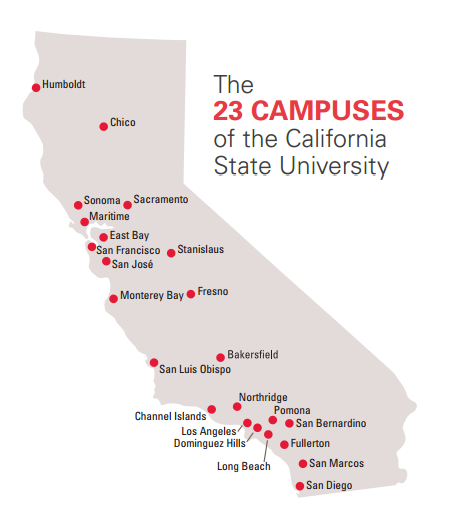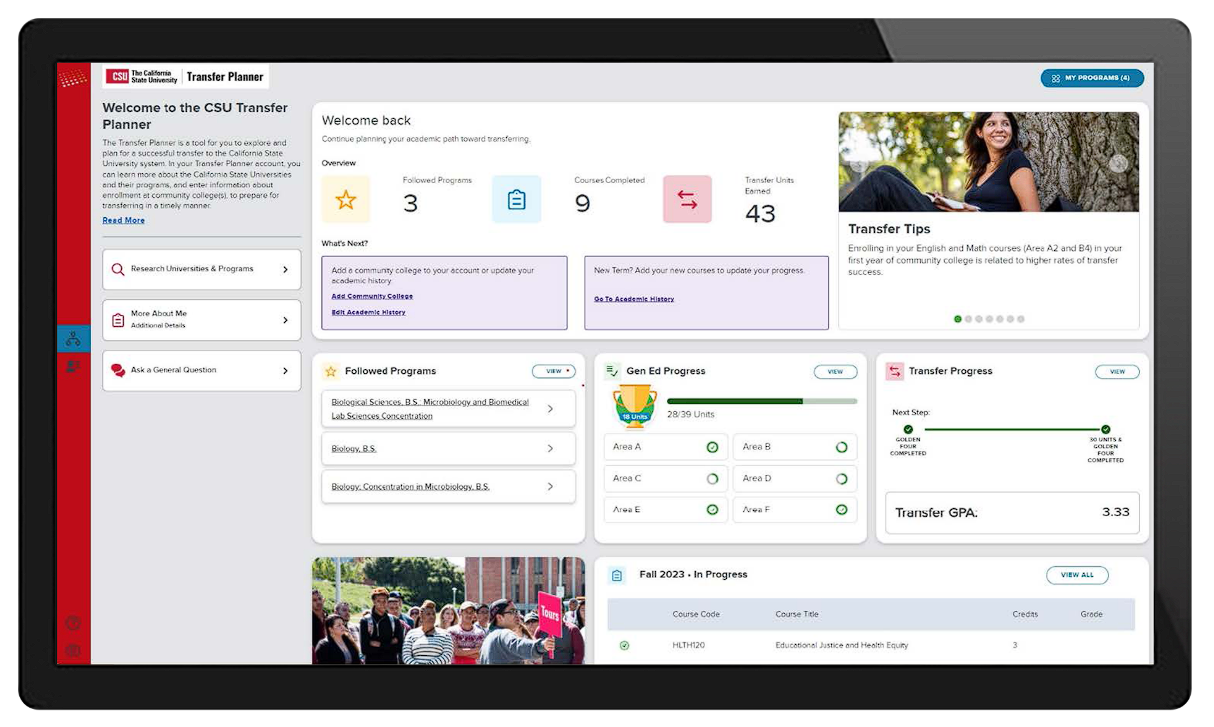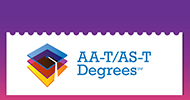
What is a CSU?
The California State University system is one of two public university systems in California. Made up of 23 CSU campuses, serving over 400,00 students, it is the largest, most diverse, and one of the most affordable university systems in the country.
The CSU offers Bachelor's and Master's degree programs in about 240 subject areas, and a variety of teaching credential programs. Select doctoral degrees are also offered jointly with the University of California or with Private universities in California.
The following information can help you learn more about how to meet requirements to enter a CSU campus as a transfer student, where the campuses are located, which academic programs are offered by campus, and how to apply for transfer.
Incoming first-year students: The Transfer Success Pathway (TSP) offers you:
- Guaranteed admission to one of 23 universities.
- Additional academic advising while you’re a community college student.
- Access to the CSU Transfer Planner to stay on track.
- More options to advance your education and your career
Application cycle for the Transfer Success Pathway: August 1 - October 31, 2025
Learn more here: Transfer Success Pathway Brochure, or schedule a meeting with our team: Transfer Center Appointments
CSU Transfer Admission Information:
Important information for students who start at College of Marin in the Fall of 2025 or later:
To be eligible to transfer to a CSU, you must complete the CAL-GETC (California General Education Transfer Curriculum). Eligibility requirements include:
- Complete 60 CSU-transferable semester units
- Have at least a 2.0 GPA (higher GPA may be needed for competitive campuses or majors)
- Complete the required major preparation courses for your intended major
- General Education Courses include: (full pdf)
- Must complete "Golden Four" with a C or higher (link):
- Oral Communication (1C)
- Written Communication (1A)
- Critical Thinking (1B)
- Mathematics/Quantitive Reasoning (2)
- Must complete "Golden Four" with a C or higher (link):
GENERAL EDUCATION OPTIONS FOR STUDENTS WHO STARTED BEFORE FALL 2025 (LINK)
Students who started before Fall 2025 (and maintain catalog rights) may choose to follow Cal-GETC (above), IGETC, CSU Breadth, or the prior version of COM's local GE, depending on their academic goals.
- IGETC— The Intersegmental General Education Transfer Curriculum (IGETC) is a 37-unit general education pattern that allows California Community College students to fulfill lower-division general education (GE) requirements for either the CSU or UC system without the need, after transfer, to take additional lower-division GE requirements. Please note that not all departments at the UCs accept IGETC. Meet with a counselor to determine if IGETC aligns with your educational goals.
- CSU Breadth— The CSU General Education Breadth (CSU GE) is a 39-unit general education pattern that allows California Community College students to fulfill lower-division GE requirements for the CSU. Meet with a counselor to determine if CSU Breadth aligns with your educational goals.
- Local COM General Education—The College of Marin’s local general education pattern meets the general education requirements for an Associate Degree in Arts or Sciences. Please note that this general education pattern does not meet the Associate Degree for Transfer (ADT) requirements. For ADTs, you must complete IGETC or CSU Breadth.
Completing any of the above patterns (or prior completion of a bachelor's degree from an accredited institution) will meet the general education requirement for a local AA/AS degree from College of Marin.
Students should work with a COM counselor and a CSU advisor to understand how to prepare for their majors. This will guide students to take the appropriate general education and major prep coursework. Make an appointment with a College of Marin counselor by calling (415)485-9432 or make an appointment through the MyCOMportal.
Try out the new CSU Transfer Planner, an online tool designed to help California Community College students explore and prepare for transfer to any of the 23 CSU campuses.
With the CSU Transfer Planner, you can:
- Explore CSU campuses, degree programs, and transfer requirements
- Save programs you're interested in for easy access later
- Track your completed coursework and general education progress
- Compare your GPA with admission requirements
- Get tips and guidance to stay on track for transfer
- Whether you're getting ready to transfer or just starting to explore your options, the CSU Transfer Planner can help you stay organized and informed.
Create an account or log in to get started.
CSU Transfer Planner

Assist.org
Assist.org helps you find community college courses that are transferable to a UC or CSU campus, how those transferable courses might be used to satisfy major preparation or general education, and helps you understand which courses are required or recommended for transfer according to major and campus.
*Written instructions PDF
Impacted Majors
The goal when applying for college admission is to make yourself as competitive as possible. When applying to the CSU system, this is especially important if the school or major you want is impacted.
Impacted programs and campuses are those that receive far more applications than there is space for. When campuses and programs are impacted, they will be more selective when admitting students and may use supplementary admissions criteria to screen applicants.
Currently, Fullerton, Long Beach, San Diego, San Jose, Fresno, and San Luis Obispo are all impacted campuses. An impacted campus means every major at that campus is highly competitive.
Other campuses often have certain impacted majors, even if the whole campus is not impacted. View the impacted undergraduate majors and campuses information at calstate.edu for more information.
To be a more competitive applicant to impacted programs and campuses, students should: |
|
CSU General Education-Breadth (Only for Students who started before Fall 2025)
California State University (CSU) General Education-Breadth 2023-2024
Students transferring to a CSU may complete their general education in one of several ways: |
|
*Meet with a counselor to find out which is best for you.
Please note: CSU Breadth and IGETC are not an admissions requirement and are not recommended for all majors. Students majoring in STEM fields such as Engineering, Biological and Physical Sciences or majors that require extensive lower division preparation are not encouraged to follow IGETC.
Associate Degrees for Transfer: AA-T and AS-T
The Associate of Arts for Transfer (AA-T) and Associate of Science for Transfer (AS-T) allow students to earn an associate degree and a bachelor's degree at a CSU, with no wasted units. They are intended to make it easier for CSU-bound students to successfully transfer by having universal lower division major prep requirements for all 23 CSU campuses.
The AA-T and AS-T degrees offer a simple and direct path to transfer to the CSU system.
Other benefits include:
- Guaranteed admission to a CSU, but not necessarily to a particular campus;
- GPA bump of .10 or .20 when applying to an impacted campus or major;
- Students can receive priority admissions to their local CSU campus to a major deemed similar to the AA-T or AS-T major;
- After transferring into a CSU, guaranteed degree completion within 60 semester units.
Requirements for an AA-T or AS-T include:
- Completion of required general education coursework;
- Completion of the courses required for the specific AA-T/AS-T major;
- Completion of 60 CSU-transferable units;
- 2.0 GPA (Note: student’s GPA will need to be more competitive if applying to an impacted campus or major)
- Completion of all requirements by the end of the Spring semester if transferring in Fall
College of Marin currently offers the following AA-T and AS-T degrees: |
|


